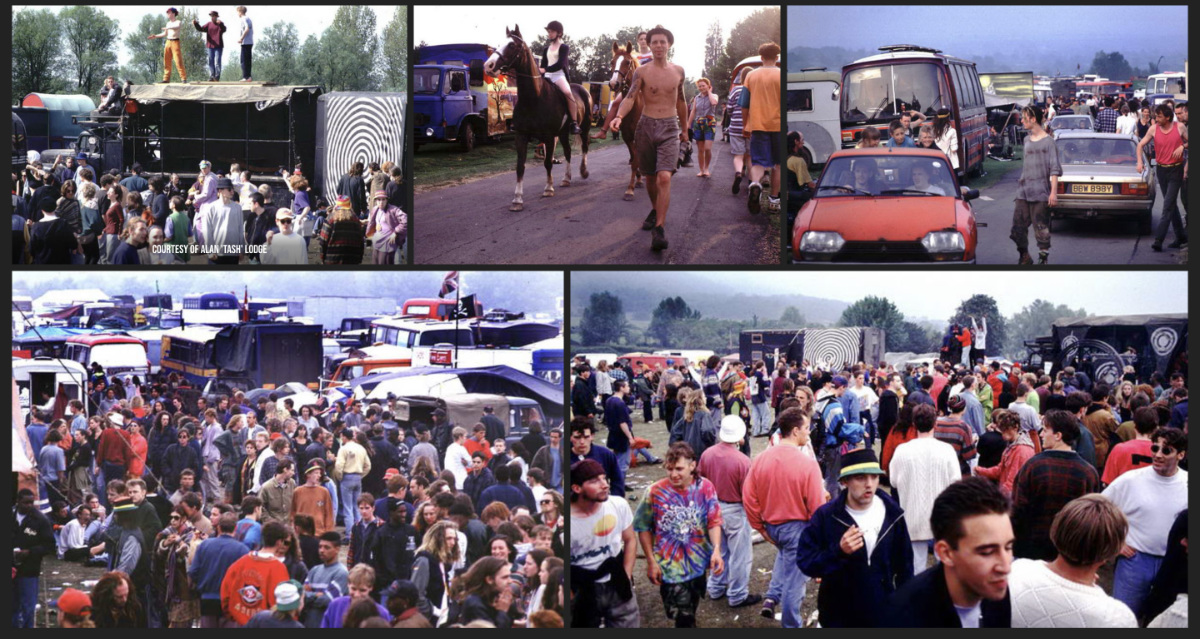Although they have their own rich electronic music culture, anarchic sensibility and furious, free-thinking sounds, free parties are often glossed over in the UK rave culture story. All too often, narratives focus instead on well-worn acid house anecdotes and later London-centric jungle/ drum & bass antics.
Aaron Trinder is a director looking to reverse this with Free Party: A Folk History, a documentary focusing on the key players in the free party scene. In this edition of Bassbin Book Club, Rob Smith chats to Aaron about his upcoming doc and the books and flicks that inspired him to make it. Find tour dates for screenings of the film in UK cinemas in late October / early November here.
When/how did you first come into contact with free party culture? What was your first free party experience?
It depends on what you mean by ‘free party culture’! As a kid there were lots of free festivals such as the Rock Against Racism concerts that I went to – but in 1988 I was camping with a mate in the Glastonbury area and heard on the radio that thousands of hippies were gathering around the Tor. It was a free festival and it became my first ‘psychedelic experience’ too – stumbling through the fields. I suppose my first ‘free party’ was the Roundhouse, Camden in 1991 – which plays a pivotal role in the film I’ve made.
What makes free party history ‘folk’ history?
I was keen for this film to be focused on the people that lived it and their perspectives on these amazing events, rather than a top down ‘voice of authority’ which other films claim to have. It fitted the story, the tales around the campfire, with occasional embellishments acceptable in the name of a good story. Having said that, and despite the lack of documentation I was amazed at how consistent people’s stories were – most of the time!
How could free party heads ever be labelled ‘folk devils’?
The media always needs a folk devil to galvanise middle England behind the government’s agenda: Young people/youth cultures have always been an easy target. Mods and rockers, hippies, punks, ravers, ethnic minorities, asylum seekers, single mums, gender diverse people, they’ve all been branded folk devils over the years…
Do you think there’s anything rave docs often get wrong, anything you wanted your film to do differently?
I wanted to avoid the usual story of Ibiza, Pete Tong, Shoom etc.. It’s very briefly referenced but this story is less a rave story and more of a cultural history which had music as its driving force. Amazing music.
What value do you see in recording the history of free parties?
It’s very much an untold story, or, if told it’s very misrepresented. New Age travellers particularly have got a terrible rep in previous stories – despite the fascinating cultural idea their lifestyle contains and their heritage to our modern day festival culture.
How did you collect footage to use in the film? Have you always been filming footage at free parties?
Having a camera at free parties was not the done thing, so it was extremely tricky to find people who did have it and then convince them I intended to use it well. We spent a long time building these relationships and bringing people who filmed and took stills into the process of the filmmaking. I think it was very collaborative and inclusive as we did a number of work-in-progress screenings for everyone involved.
Has delving into the history of the scene changed your opinion about any aspects of it, or any issues surrounding it?
It was a very complex cultural mix of urban ravers, countryside ravers and travellers – but each of these broad definitions has a number of sub-divisions and sub-sub cultures which means branding people as a ‘traveller’ can mean many things. People are very individual and all sorts of nuance is required.
Any documentary recommendations, music-related or otherwise?
I’ve watched a documentary almost every night for the past four years. Probably my fave has been Brett Morgan’s Moonage Daydream… just sublime.
Any favourite electronic music or club culture-related books?
John Higgs’ book on the KLF was a big inspiration to me…: someone else got to make the film about that one ahead of me sadly (but did a great job). But of course, Harry’s book ‘Dreaming in Yellow‘ and Mark’s book ‘A Darker Electricity’ have to be in there too.
Post-internet and post-commercialisation of dance music, how can the anarchic element of free parties live on? Where do you think free party culture is headed next?
Good question. And one which should be aimed at the youth. Not an old guy like me. I hope the youth surprise us with something mind-blowing – which will be the next folk devil no doubt. It’s become so expensive to go clubbing and go to festivals that I actually think free festivals and free parties have a big future. As Ixy says in my film ‘The right to party, it’s a basic human right’. If you can’t afford to party within the mainstream, what are you going to do? Throw a free party.
What was the last free party you went to?
I’m lucky if I get away from my edit suite these days. But we did some free events off the back of a work-in-progress screening in Stroud this year with Grace Sands from DiY on the decks and the original DiY Back Box sound system – it was so much fun.


